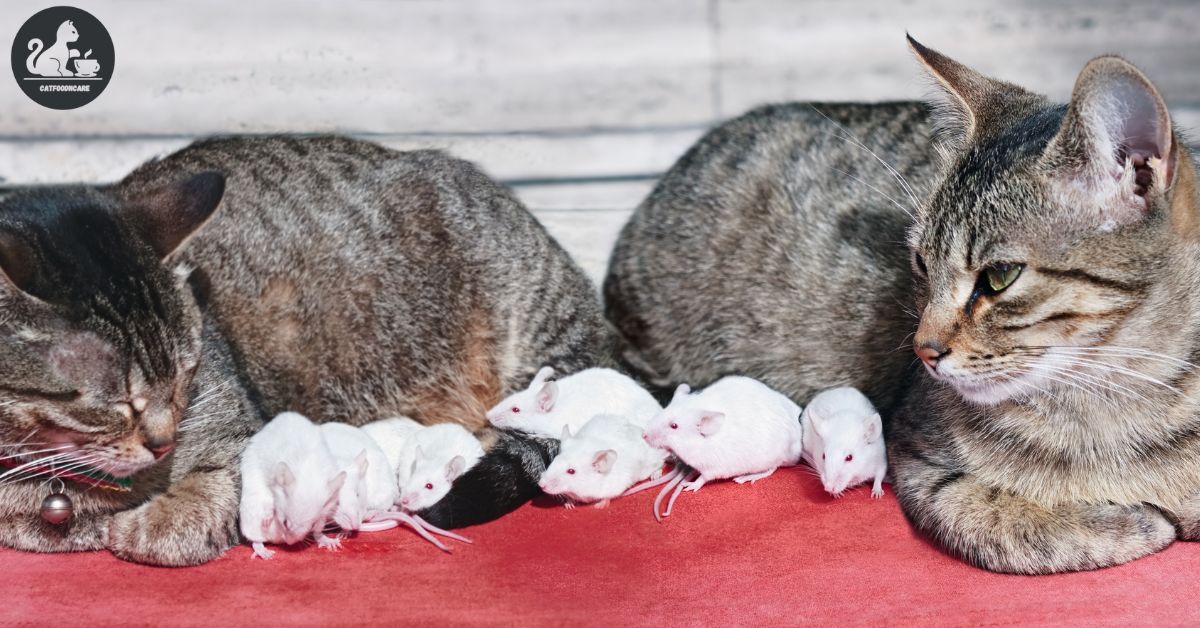Cats are known for their hunting instincts and skills. They are natural hunters and are often seen chasing and playing with mice. But, can cats eat mice? The short answer is yes, cats can eat mice. However, it’s not as simple as it sounds. While hunting and eating mice is a part of a cat’s natural behavior, it may not always be safe or healthy for them.
Mice can be a source of food for cats, especially for those with access to mice in their environment. However, feeding on mice may expose cats to various risks. For instance, a mouse infestation in the house might have been treated with rat poison, which can cause internal bleeding in cats if ingested.
Moreover, the feline diet is complex and requires a balance of amino acids, fatty acids, and other nutrients, which may not be fully provided by a mice diet. Commercial cat foods, whether dry cat food or wet food, are formulated to meet these nutritional needs.
Therefore, while cats can technically eat mice, it’s usually safer and healthier to feed them commercial cat foods.
What Do Veterinarians Say about Feeding Mice to Cats?
Veterinarians generally advise against feeding mice to cats. While cats are natural hunters with strong hunting instincts, there are several reasons why mice may not be a good source of food. Firstly, mice can carry diseases that can be harmful to cats and even to humans. This is especially risky for pregnant women and those with weak immune systems.

Secondly, if the mice have been killed using rat poison, this type of poison can cause internal bleeding in cats. Even mechanical traps or sticky traps can injure cats.
Thirdly, feeding cats mice can encourage their hunting behavior, which can be a problem if you have other small pets or if the cat starts bringing dead mice home.
Instead of mice, commercial cat foods are recommended. These foods are specially formulated to provide all the essential amino acids and fatty acids cats need. They also come in both wet food and dry food options.
If you have a mouse infestation, it’s better to use pest control methods like sonic pest repellent or peppermint oil, which are safe for cats.
while cats are obligate carnivores and natural-born hunters, feeding them mice is not recommended. It’s better to stick to commercial cat foods and safe pest control methods.
Can Cats Eat Mice?
Yes, cats can eat mice. Cats are natural hunters with strong hunting instincts and skills. Eating mice is a part of their natural diet. However, it’s important to note that not all mice are safe for cats to eat. If a mouse has consumed rat poison or any other type of poison, it can cause internal bleeding or other health issues in cats.
Cats are obligate carnivores, which means they need a source of food that is rich in amino acids and fatty acids. These are found in animal prey like mice. However, commercial cat foods like dry cat food and wet food are designed to provide all the necessary nutrients for cats.
If your home has a mouse infestation, cats can be a form of pest control. But, it’s safer to use mechanical traps, sticky traps, or sonic pest repellents. Using peppermint oil can also deter mice.
While cats are nocturnal animals and natural-born hunters, it’s best to limit their access to mice. Cats can pass on diseases from mice to humans, especially to pregnant women and those with weak immune systems.
While cats can eat mice, it’s safer and healthier for them to eat commercial cat foods.
Nutritional Benefits of Mice for Cats?
Cats are natural hunters and often hunt mice. But, can cats eat mice? Yes, they can. Mice can provide some nutritional benefits for cats:
- Mice are a source of food that matches a cat’s natural diet. They contain the right balance of amino acids and fatty acids that cats need.
- Mice can help cats maintain their hunting instincts and hunting skills. This is important for cats, especially those that live outdoors.
- Eating mice can also help control the mouse infestation problem. Cats are nocturnal animals and natural-born hunters, making them a good form of pest control.
- Mice can provide a source of animal fibres that are not found in commercial cat foods. This can help improve a cat’s digestion.
However, it’s important to note that not all mice are safe for cats to eat. Mice that have consumed rat poison can cause internal bleeding in cats. Also, wild mice can carry diseases that can be harmful to cats and even cats to humans. Therefore, it’s always best to provide your cat with a balanced diet that includes dry cat food or wet food and monitor their food intake.
Potential Health risks of feeding mice to cats?
- Cats are natural hunters and mice are part of their natural diet. However, feeding mice to cats can pose several health risks.
- Mice can carry diseases that can be transferred to cats. These diseases can weaken the cat’s immune system and make them sick.
- If a mouse has ingested rat poison, it can cause internal bleeding in cats. The type of poison used in pest control can be deadly to cats.
- Mice can be infested with parasites. When a cat eats an infested mouse, the parasites can transfer to the cat. This can lead to various health issues.
- Pregnant women should be cautious if their cats have access to mice. Some diseases carried by mice can be harmful to unborn babies.
- Feeding cats with mice can disrupt their food intake. Cats may start refusing commercial cat foods or wet food and dry food, which are balanced and contain essential amino acids and fatty acids.
- Cats can get injured while hunting mice. Mice are nocturnal animals and cats may get into accidents while hunting at night.
- Lastly, feeding mice to cats can encourage their hunting instincts. This can lead to unwanted hunting behavior in the house.
How to Feed Mice to Cats Safely?
Cats are natural hunters and their hunting instincts are often triggered by small, fast-moving creatures like mice. However, feeding your cat mice isn’t as simple as letting them loose in a room together. Here’s a step-by-step guide on how to feed mice to cats safely.
Step 1: Consider the Source of Food
Firstly, it’s important to consider the source of food. Cats can catch mice on their own, but it’s not always safe. Mice can carry diseases that can be harmful to cats and to humans. If you have a mouse infestation, it’s better to hire a professional pest control service than to let your cat handle it.
Step 2: Purchase Pre-Killed Mice
If you want to feed your cat mice, the safest way is to purchase pre-killed dead mice from a reliable source. These mice are bred in clean environments and are free from diseases.
Step 3: Prepare the Mouse
Before feeding the mouse to your cat, ensure it’s at room temperature. Cats prefer their food to be at the same temperature as their prey would be in the wild.
Step 4: Monitor Your Cat
Always monitor your cat when they’re eating a mouse. This ensures they don’t choke on any bones and allows you to see if they have any adverse reactions to the new food.
Step 5: Balance Their Diet
While mice can be a good source of essential amino acids and fatty acids for cats, they shouldn’t be the only thing your cat eats. Balance their diet with commercial cat foods, wet food, and dry food.
Step 6: Regular Vet Check-ups
Regular vet check-ups are crucial when introducing new foods into your cat’s diet. This ensures their health and safety.
Remember, while cats are obligate carnivores and have a strong hunting instinct, feeding them mice should be done carefully and responsibly. It’s important to balance their natural diet with other foods to ensure they’re getting all the nutrients they need.
Also, be aware that rat poison and other types of poison can cause internal bleeding in cats. If you suspect a mouse has ingested poison, do not let your cat eat it. Instead, use mechanical traps or sonic pest repellents to deal with any mouse problems.
Feeding your cat mice can help satisfy their natural hunting behaviors and provide them with a rich source of protein. However, it’s important to do it safely and responsibly to protect the health of your cat and your entire family.
Conclusion
In wrapping up, it’s clear that cats are natural hunters with strong hunting instincts. They can eat mice, but it’s not the best source of food for them. Commercial cat foods provide all the essential amino acids and fatty acids they need. If your cat has access to mice, it’s important to ensure they aren’t consuming rat poison or other types of poison. Pest control methods like mechanical traps, sticky traps, or sonic pest repellents are safer. Remember, while cats’ hunting behavior is a natural instinct, it’s best to provide them with a reliable source of food like wet food or dry cat food on a regular basis.
Recent Posts
10 Best Canned Cat Foods of 2024, According to Veterinarians
Inside this expert-backed list of 2024's top wet cat foods, discover why veterinarians trust these brands for optimal feline nutrition.
Grab expert insights into the top-rated wet cat foods that veterinarians trust most, and discover why some brands outshine...

